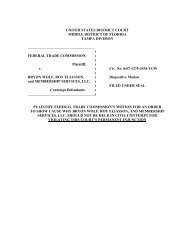HELO RCPT TO QUIT MAIL FROM DATA - Federal Trade Commission
HELO RCPT TO QUIT MAIL FROM DATA - Federal Trade Commission
HELO RCPT TO QUIT MAIL FROM DATA - Federal Trade Commission
You also want an ePaper? Increase the reach of your titles
YUMPU automatically turns print PDFs into web optimized ePapers that Google loves.
Subject Line Labeling As a Weapon Against Spam<br />
laws and that the labeling requirements were “highly ineffective.” 24 Based on<br />
interviews conducted in preparation for this Report, the <strong>Commission</strong> discovered<br />
that many ISPs, both large and small, chose not to filter based on the states’ ADV<br />
labeling requirements when they were in effect. 25 Therefore, the low number of<br />
labeled messages reviewed is probably not due to ISP subject line filtering.<br />
B. Subject Line Labeling Laws in Other Countries<br />
South Korea, Japan, and most member states of the European Union have<br />
implemented anti-spam regulations in recent years. Most European countries<br />
generally prohibit the sending of UCE to consumers unless the consumer has<br />
given prior consent to receiving such emails. 26 In addition, some European<br />
countries, such as the United Kingdom (“U.K.”), Finland, Norway, and Poland,<br />
have enacted laws requiring a label in the subject line of a UCE. 27 Because UCE<br />
legally cannot be sent to consumers without their prior consent in these countries,<br />
however, the labeling requirement applies only in limited circumstances. For<br />
example, it may apply when an unsolicited commercial message is sent to a<br />
business. 28<br />
In any event, there appears to have been little compliance with such labeling<br />
requirements in Europe. For example, in a 2003 report, a U.K. parliamentary<br />
committee stated that:<br />
[m]ost unsolicited email sent within the UK, even that which is sent by<br />
organisations which otherwise regard themselves as acting within the<br />
law, fails to abide by [the requirement that] any unsolicited commercial<br />
communication must be ‘identifiable clearly and unambiguously as soon<br />
24. ICC: Halpert, 8. See also, MCI: Mansourkia, 7; Email Service Provider Coalition (“ESPC”):<br />
Hughes, 13. Similarly, a representative from MCI stated that after examining a subset of emails about which<br />
MCI received complaints, some of them had an “ADV” label, but the majority did not. MCI: Mansourkia,<br />
7. In addition, the executive director of the ESPC stated, “I think it’s fair to say that during that time [when<br />
state labeling laws were in effect] we saw exponential growth in spam and at the same time we didn’t see any<br />
ADV labels showing up in inboxes around the United States.” ESPC: Hughes, 13.<br />
25. AOL: Jacobsen, 5; Telephone conversation with Aristotle: Bowles; Earthlink: Youngblood, 7. The<br />
representatives from AT&T and MCI were not sure if they filtered based on a subject line label. AT&T:<br />
Israel, 7; MCI: Mansourkia, 7. UOL is the only ISP that affirmatively stated that it used the “ADV” label as<br />
one basis for filtering. UOL: Squire, 8.<br />
26. See Background Paper for the OECD Workshop on Spam 19-20, Annex, DSTI/ICCP2003(10)/<br />
FINAL (Jan. 22, 2004), available at http://www.olis.oecd.org/olis/2003doc.nsf/LinkTo/dsti-iccp(2003)10final.<br />
27. Id. at 22.<br />
28. Id. at 32.<br />
7

















